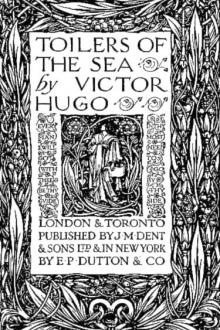Toilers of the Sea by Victor Hugo (trending books to read txt) 📕

- Author: Victor Hugo
- Performer: -
Book online «Toilers of the Sea by Victor Hugo (trending books to read txt) 📕». Author Victor Hugo
"There is news, Gilliatt."
"Where is that?"
"At the Bravées."
"What is it?"
"I am too far off to tell you the story."
Gilliatt shuddered.
"Is Miss Déruchette going to be married?"
"No; but she had better look out for a husband."
"What do you mean?"
"Go up to the house, and you will learn."
And Sieur Landoys whipped on his horse.
BOOK V THE REVOLVER I CONVERSATIONS AT THE JEAN AUBERGESieur Clubin was a man who bided his time. He was short in stature, and his complexion was yellow. He had the strength of a bull. His sea life had not tanned his skin; his flesh had a sallow hue; it was the colour of a wax candle, of which his eyes, too, had something of the steady light. His memory was peculiarly retentive. With him, to have seen a man once, was to have him like a note in a note-book. His quiet glance took possession of you. The pupil of his eye received the impression of a face, and kept it like a portrait. The face might grow old, but Sieur Clubin never lost it; it was impossible to cheat that tenacious memory. Sieur Clubin was curt in speech, grave in manner, bold in action. No gestures were ever indulged in by him. An air of candour won everybody to him at first; many people thought him artless. He had a wrinkle in the corner of his eye, astonishingly expressive of simplicity. As we have said, no abler mariner existed; no one like him for reefing a sail, for keeping a vessel's head to the wind, or the sails well set. Never did reputation for religion and integrity stand higher than his. To have suspected him would have been to bring yourself under suspicion. He was on terms of intimacy with Monsieur Rébuchet, a money-changer at St. Malo, who lived in the Rue St. Vincent, next door to the armourer's; and Monsieur Rébuchet would say, "I would leave my shop in Clubin's hands."
Sieur Clubin was a widower; his wife, like himself, had enjoyed a high reputation for probity. She had died with a fame for incorruptible virtue. If the bailli had whispered gallant things in her ear, she would have impeached him before the king. If a saint had made love to her, she would have told it to the priest. This couple, Sieur and Dame Clubin, had realised in Torteval the ideal of the English epithet "respectable." Dame Clubin's reputation was as the snowy whiteness of the swan; Sieur Clubin's like that of ermine itself—a spot would have been fatal to him. He could hardly have picked up a pin without making inquiries for the owner. He would send round the town-crier about a box of matches. One day he went into a wine-shop at St. Servan, and said to the man who kept it, "Three years ago I breakfasted here; you made a mistake in the bill;" and he returned the man thirteen sous. He was the very personification of probity, with a certain compression of the lips indicative of watchfulness.
He seemed, indeed, always on the watch—for what? For rogues probably.
Every Tuesday he commanded the Durande on her passage from Guernsey to St. Malo. He arrived at St. Malo on the Tuesday evening, stayed two days there to discharge and take in a new cargo, and started again for Guernsey on Friday morning.
There was at that period, at St. Malo, a little tavern near the harbour, which was called the "Jean Auberge."
The construction of the modern quays swept away this house. At this period, the sea came up as far as the St. Vincent and Dinan gates. St. Merlan and St. Servan communicated with each other by covered carts and other vehicles, which passed to and fro among vessels lying high and dry, avoiding the buoys, the anchors, and cables, and running the risk now and then of smashing their leathern hoods against the lowered yards, or the end of a jibboom. Between the tides, the coachmen drove their horses over those sands, where, six hours afterwards, the winds would be beating the rolling waves. The four-and-twenty carrying dogs of St. Malo, who tore to pieces a naval officer in 1770, were accustomed to prowl about this beach. This excess of zeal on their part led to the destruction of the pack. Their nocturnal barkings are no longer heard between the little and the great Talard.
Sieur Clubin was accustomed to stay at the Jean Auberge. The French office of the Durande was held there.
The custom-house officers and coast-guardmen came to take their meals and to drink at the Jean Auberge. They had their separate tables. The custom-house officers of Binic found it convenient for the service to meet there with their brother officers of St. Malo.
Captains of vessels came there also; but they ate at another table.
Sieur Clubin sat sometimes at one, sometimes at the other table, but preferred the table of the custom-house men to that of the sea captains. He was always welcome at either.
The tables were well served. There were strange drinks especially provided for foreign sailors. A dandy sailor from Bilboa could have been supplied there with a helada. People drank stout there, as at Greenwich; or brown gueuse, as at Antwerp.
Masters of vessels who came from long voyages and privateersmen sometimes appeared at the captains' table, where they exchanged news. "How are sugars? That commission is only for small lots.—The brown kinds, however, are going off. Three thousand bags of East India, and five hundred hogsheads of Sagua.—Take my word, the opposition will end by defeating Villèle.—What about indigo? Only seven serons of Guatemala changed hands.—The Nanino-Julia is in the roads; a pretty three-master from Brittany.—The two cities of La Plata are at loggerheads again.—When Monte Video gets fat, Buenos Ayres grows lean.—It has been found necessary to transfer the cargo of the Regina-Cœli, which has been condemned at Callao.—Cocoas go off briskly.—Caraque bags are quoted at one hundred and thirty-four, and Trinidad's at seventy-three.—It appears that at the review in the Champ de Mars, the people cried, 'Down with the ministers!'—The raw salt Saladeros hides are selling—ox-hides at sixty francs, and cows' at forty-eight.—Have they passed the Balkan?—What is Diebitsch about?—Aniseed is in demand at San Francisco. Plagniol olive oil is quiet.—Gruyère cheese, in bulk, is thirty-two francs the quintal.—Well, is Leon XII. dead?" etc., etc.
All these things were talked about and commented on aloud. At the table of the custom-house and coast-guard officers they spoke in a lower key.
Matters of police and revenue on the coast and in the ports require, in fact, a little more privacy, and a little less clearness in the conversation.
The sea-captains' table was presided over by an old captain of a large vessel, M. Gertrais-Gaboureau. M. Gertrais-Gaboureau could hardly be regarded as a man; he was rather a living barometer. His long life at sea had given him a surprising power of prognosticating the state of the weather. He seemed to issue a decree for the weather to-morrow. He sounded the winds, and felt the pulse, as it were, of the tides. He might be imagined requesting the clouds to show their tongue—that is to say, their forked lightnings. He was the physician of the wave, the breeze, and the squall. The ocean was his patient. He had travelled round the world like a doctor going his visits, examining every kind of climate in its good and bad condition. He was profoundly versed in the pathology of the seasons. Sometimes he would be heard delivering himself in this fashion—"The barometer descended in 1796 to three degrees below tempest point." He was a sailor from real love of the sea. He hated England as much as he liked the ocean. He had carefully studied English seamanship, and considered himself to have discovered its weak point. He would explain how the Sovereign of 1637 differed from the Royal William of 1670, and from the Victory of 1775. He compared their build as to their forecastles and quarter-decks. He looked back with regret to the towers upon the deck, and the funnel-shaped tops of the Great Harry of 1514—probably regarding them from the point of view of convenient lodging-places for French cannon-balls. In his eyes, nations only existed for their naval institutions. He indulged in some odd figures of speech on this subject. He considered the term "The Trinity House" as sufficiently indicating England. The "Northern Commissioners" were in like manner synonymous in his mind with Scotland; the "Ballast Board," with Ireland. He was full of nautical information. He was, in himself, a marine alphabet and almanack, a tariff and low-water mark, all combined. He knew by heart all the lighthouse dues—particularly those of the English coast—one penny per ton for passing before this; one farthing before that. He would tell you that the Small Rock Light which once used to burn two hundred gallons of oil, now consumes fifteen hundred. Once, aboard ship, he was attacked by a dangerous disease, and was believed to be dying. The crew assembled round his hammock, and in the midst of his groans and agony he addressed the chief carpenter with the words, "You had better make a mortise in each side of the main caps, and put in a bit of iron to help pass the top ropes through." His habit of command had given to his countenance an expression of authority.
It was rare that the subjects of conversation at the captains' table and at that of the custom-house men were the same. This, however, did happen to be the case in the first days of that month of February to which the course of this history has now brought us. The three-master Tamaulipas, Captain Zuela, arrived from Chili, and bound thither again, was the theme of discussion at both tables.
At the captains' table they were talking of her cargo; and at that of the custom-house people, of certain circumstances connected with her recent proceedings.
Captain Zuela, of Copiapo, was partly a Chilian and partly a Columbian. He had taken a part in the War of Independence in a true independent fashion, adhering sometimes to Bolivar, sometimes to Morillo, according as he had found it to his interest. He had enriched himself by serving all causes. No man in the world could have been more Bourbonist, more Bonapartist, more absolutist, more liberal, more atheistical, or more devoutly catholic. He belonged to that great and renowned party which may be called the Lucrative party. From time to time he made his appearance in France on commercial voyages; and if report spoke truly, he willingly gave a passage to fugitives of any kind—bankrupts or political refugees, it was all the same to him, provided they could pay. His mode of taking them aboard was simple. The fugitive waited upon a lonely point of the coast, and at the moment of setting sail, Zuela would detach a small boat to fetch him. On his last voyage he had assisted in this way an outlaw and fugitive from justice, named Berton; and on this occasion he was suspected of being about to aid the flight of the men implicated in the affair of the Bidassoa. The police were informed, and had their eye upon him.
This period was an epoch of flights and escapes. The Restoration in France was a reactionary movement. Revolutions are fruitful of voluntary exile; and restorations of wholesale banishments. During the first seven or eight years which followed the return of the Bourbons, panic was universal—in finance, in industry, in commerce, men felt the ground tremble beneath them. Bankruptcies were numerous in the commercial world; in the political, there was a general rush to escape. Lavalette had taken flight, Lefebvre Desnouettes had taken flight, Delon had taken flight. Special tribunals were again in fashion—plus Treetaillon. People instinctively shunned the Pont de Saumur,





Comments (0)